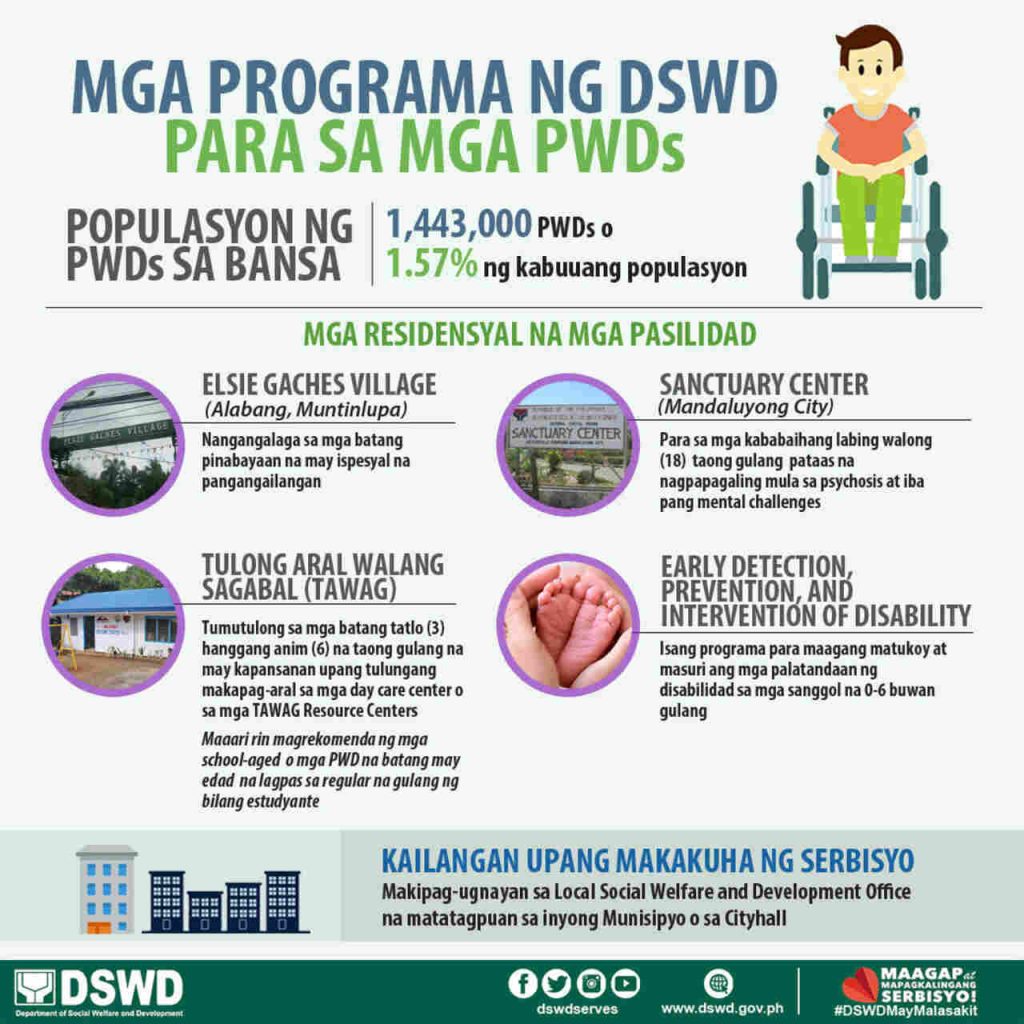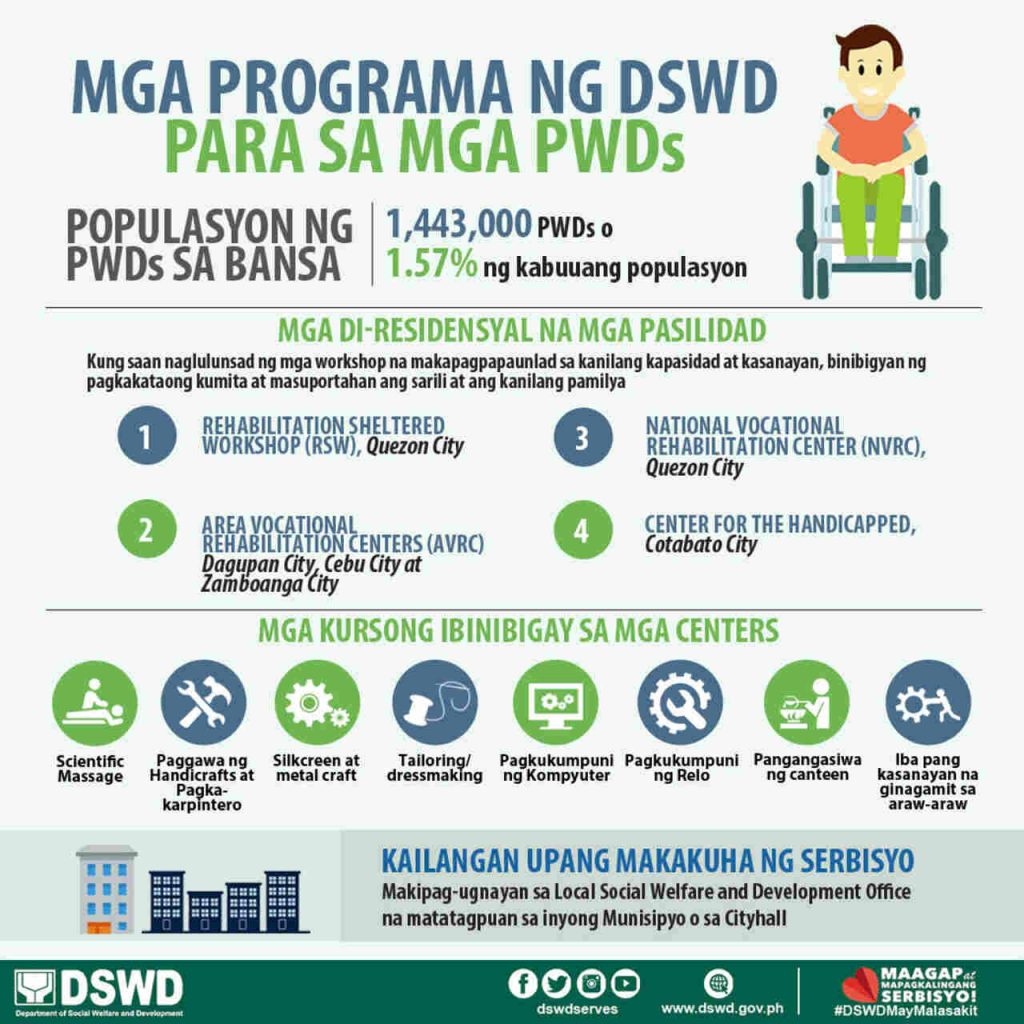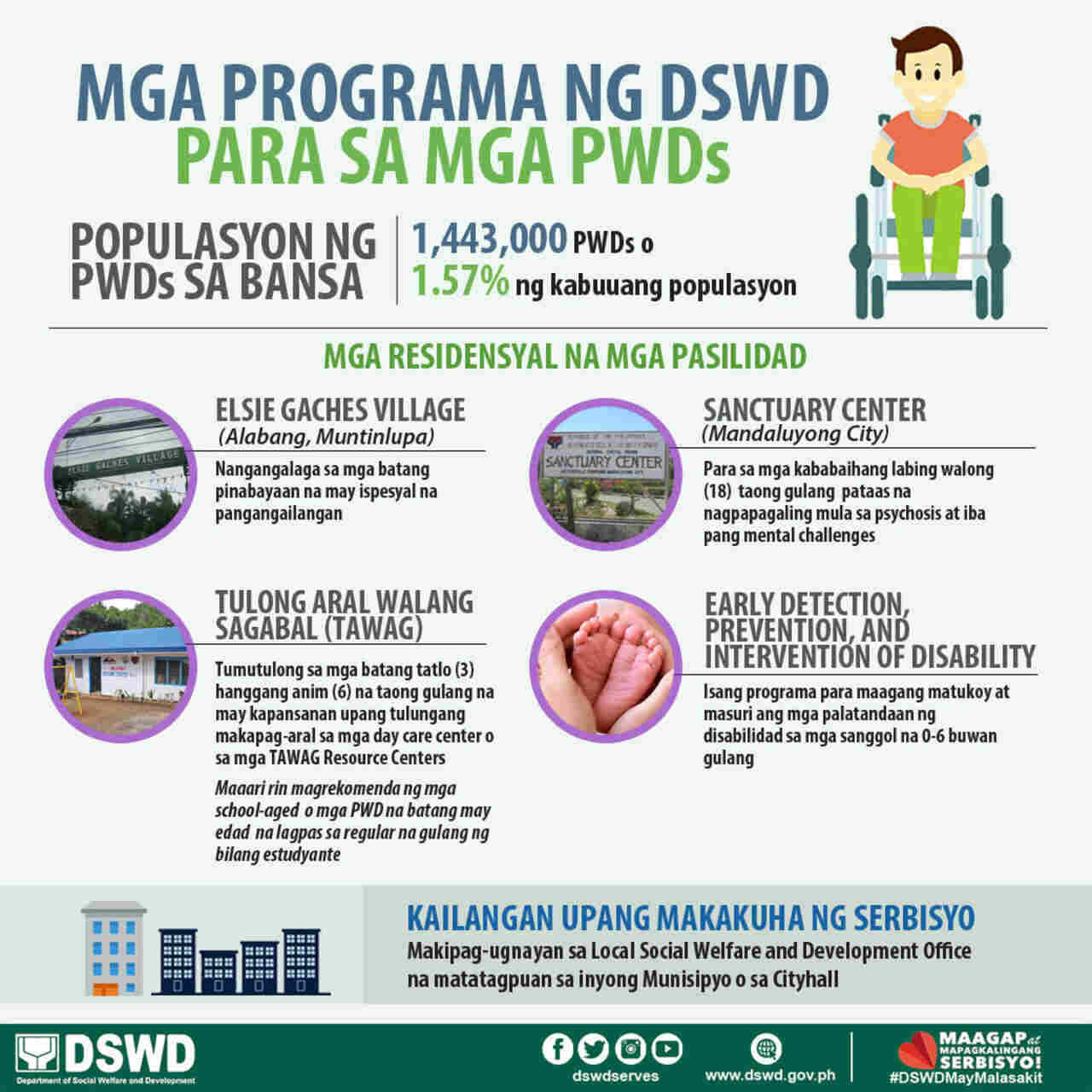The Department of Social Welfare and Development (DSWD) offers various programs and services designed to support Persons with Disabilities (PWDs) in the Philippines. Understanding how to apply for these services can significantly impact the well-being and quality of life of PWDs and their families. By accessing these services, PWDs can receive support in areas such as healthcare, education, financial aid, and community integration.
Each program is tailored to specific types of disabilities and circumstances, ensuring that every PWD receives appropriate support based on their individual needs. It’s essential to know the steps and requirements to ensure a smooth application process and to maximize the benefits provided by the DSWD for PWDs.
Overview of DSWD Programs for PWDs
The DSWD programs and services for PWDs are designed to promote inclusion, self-sufficiency, and improved quality of life. These programs, which result from its collaboration with other government bodies, include residential and non-residential programs and services, offering care, rehabilitation, livelihood support, and educational assistance.
Residential Programs for PWDs

Residential programs are provided by the DSWD to accommodate PWDs who may need full-time care, rehabilitation, or a safe environment. These services are typically offered in specialized facilities or centers.
1. Center-Based Care and Rehabilitation Services
These services are provided at DSWD-run centers where PWDs receive 24/7 care, including therapy, counseling, and other rehabilitation activities. These facilities cater to PWDs who require more intensive support due to physical, intellectual, or psychosocial disabilities.
Services Offered:
- Therapy sessions
- medical care
- skills development
- social work intervention
- recreational activities
2. Group Homes and Assisted Living Facilities
DSWD operates group homes that provide a structured yet home-like environment for PWDs who can manage semi-independent living but still require supervision.
Services Offered:
- basic resident care
- daily living skills training
- socialization activities
3. Specialized Rehabilitation Centers
These centers focus on the rehabilitation of PWDs with specific needs, such as those with severe disabilities requiring extensive therapy.
Services Offered:
- Intensive physical therapy
- occupational therapy
- psychological services
- specialized training
Non-Residential Programs for PWDs

Non-residential programs allow PWDs to access services while remaining within their communities, enabling them to receive support without full-time residential care.
1. Community-Based Rehabilitation Programs (CBRP)
The CBRP program brings rehabilitation services directly into communities to support PWDs in their home environment.
Services Offered:
- Physical therapy
- occupational therapy
- Vocational training
- community education
- awareness programs.
2. Livelihood and Skills Training Programs
These programs provide PWDs with skills training to enhance employability or support self-employment, aiming to promote economic independence.
Services Offered:
- Vocational training
- business skills development
- job placement assistance
3. Financial and Medical Assistance Programs
DSWD provides financial and medical assistance to help PWDs cover healthcare costs, medications, and assistive devices.
Services Offered:
- Financial aid for hospitalization,
- Financial aid medicines
- therapy sessions
- assistive devices like wheelchairs and hearing aids
4. Social Integration Programs
These programs focus on integrating PWDs into their communities, promoting equal participation in social, cultural, and educational activities.
Services Offered:
- support groups
- inclusive recreational events
- community awareness campaigns
5. Educational Assistance Programs
DSWD offers scholarships, tuition assistance, and educational support to PWDs, helping them access quality education and reach their full potential.
Services Offered:
- Financial support for school fees
- materials
- transportation
- allowances for personal expenses
Target Beneficiaries
The DSWD programs and services for PWDs is available nationwide and is especially focused on those with limited resources and those in need of specialized support to participate in community life.
- PWDs in Need of Rehabilitation: Individuals with physical, mental, or developmental disabilities who require therapy, skills training, and social work interventions.
- PWDs with Limited Family Support: PWDs who lack family or community support and need assistance for daily living or full-time care.
- Low-Income PWDs: Those facing financial constraints, unable to afford healthcare, medical devices, or educational support.
- PWD Students: Young PWDs requiring financial assistance for schooling, inclusive education, and skill development.
- Community-Based PWDs: Individuals living in their communities who can benefit from accessible rehabilitation services, livelihood training, and social integration programs.
Eligibility
To be eligible for these programs, one need to satisfy the following criteria:
- Must be a registered PWD in the Philippines.
- Demonstrates financial need, especially for medical or educational assistance programs.
- Requires rehabilitation, vocational training, or other specialized support due to disability.
- For residential programs, priority is given to PWDs lacking family or community support.
Requirements
To apply for DSWD assistance, PWD applicants need to meet specific requirements, which may vary depending on the program. The basic requirements generally include:
- PWD ID Card: Issued by local government units, the PWD ID card is essential for accessing most services.
- Medical Certificates: A medical certificate detailing the disability is usually required for medical assistance programs.
- Proof of Residence: Documents such as barangay clearance or utility bills may be needed to prove residency within the applicable area.
- Income Documents: Financial assistance programs may require proof of income to establish eligibility.
- Application Form: An official DSWD application form for the desired program, available at DSWD offices or their website.
How to Apply for DSWD Services for PWDs
To apply for any of these programs, PWDs need to follow these steps:
Step 1: Gather Required Documents
Collect all necessary documents, including the PWD ID, medical certificates, and any income or residence proof. Ensure that these documents are valid and updated to avoid delays.
Step 2: Visit the Nearest DSWD Office
Locate the Local Social Welfare and Development Office (LSWDO) or the nearest DSWD office or in your area or visit a regional office that handles PWD services. Some services may also be accessible through the local government’s PWD Affairs Office.
Step 3: Complete the Application Process
Submit the required documents and fill out an application form specific to the assistance you are seeking. DSWD staff may interview applicants to verify their eligibility.
Step 4: Await Approval and Follow-Up
The DSWD will review the application and verify the documents. Once approved, beneficiaries will be notified and given instructions on how to avail of the assistance. Processing times may vary depending on the program and volume of applications.
Additional Services and Benefits for PWDs
Apart from direct financial and medical support, DSWD offers additional benefits that can be availed with a PWD ID, such as:
- Discounts and Privileges: PWDs are entitled to discounts on medicines, transportation, groceries, and other essentials, including:
- 20% Discount on Lodging and Recreation
- 20% Discount on Entertainment Admission Fees
- 20% Discount on Medicines
- 20% Medical and Dental Services Discount
- 20% Discount on Domestic Travel Fare
- 5% Discount on Basic Commodities
- Continuation of GSIS, SSS, and PAG-IBIG Benefits: Formerly employed PWDs can continue to avail of benefits from government agencies like GSIS, SSS, and PAG-IBIG as needed.
- Educational Assistance: Financial aid, scholarship grants, subsidies, and other incentives, including allowances for books, learning materials, and uniforms, are provided to help PWDs students pursue primary, secondary, tertiary, and vocational or technical education.
- Priority Express Lanes: Dedicated express lanes are provided for PWDs in all commercial and government establishments, ensuring easier access to services.
- PhilHealth Coverage: Some DSWD programs extend health insurance benefits to PWDs, including PhilHealth membership or subsidies.
- Skills Training and Livelihood Support: To promote economic independence, DSWD provides livelihood and skills training for PWDs interested in entrepreneurship or job opportunities.
Where to Get the Application Form
To apply for DSWD programs and services for PWDs, you can obtain the application forms through the following channels:
- Local Social Welfare and Development Office (LSWDO). This office is typically located at your city or municipal hall, where social welfare officers can provide guidance on the application process.
- DSWD Regional and Field Offices: Visit the nearest DSWD regional or field office in your area.
- Barangay Offices: In some cases, barangay offices and social workers have application forms and information on the available services for PWDs.
Important Tips for PWD Applicants
For hassle-free application, all PWDs interested in these DSWD programs are encouraged to:
- Prepare All Documents: Incomplete applications can lead to delays, so make sure all required paperwork is organized and up-to-date.
- Seek Assistance if Needed: Some DSWD offices have personnel dedicated to assisting PWD applicants through the process.
- Follow-Up Regularly: After submitting an application, stay in touch with the DSWD office for updates on your application status.
- Utilize PWD Discounts and Privileges: Always carry your PWD ID to access discounts and benefits in various establishments.
Video: DSWD Programs for Indigents, Solo Parents, and PWDs
Watch this video from Prof. Allan Noguera, MBA LPT, to learn more about how the DSWD helps the vulnerable groups, including but not limited to Indigenous People (IPs), solo parents, and PWDs, among others. Watch until the end to find the assistance programs available for you.
Summary
Applying for DSWD assistance for PWDs involves gathering documents, submitting an application, and following up with the DSWD office. Programs include medical, financial, educational, and livelihood support aimed at improving the quality of life for PWDs. Ensuring you meet all requirements and staying informed about benefits can help PWDs fully benefit from the available services.
